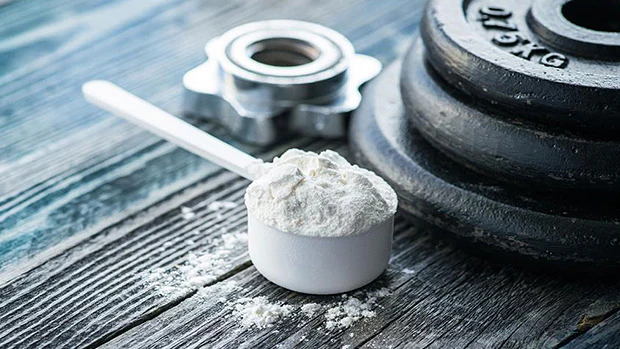
The Benefits of Creatine in Building Muscle: A Comprehensive Guide
Oct 15, 2024
4 min read
1
1
0
Creatine is one of the most researched and popular supplements in the fitness world, known for its ability to enhance muscle growth, strength, and athletic performance. Whether you're a seasoned bodybuilder, a weekend warrior, or someone just starting your fitness journey, understanding how creatine works can help you make informed decisions about your training regimen. In this blog, we’ll explore the science behind creatine, its benefits for muscle building, and how to effectively incorporate it into your routine.
What is Creatine?

Creatine is a naturally occurring compound found primarily in muscle cells, synthesized from the amino acids glycine and arginine. It plays a crucial role in producing adenosine triphosphate (ATP), the energy currency of our cells, particularly during high-intensity, short-duration exercises like sprinting and weightlifting. While your body produces creatine, it can also be obtained from dietary sources, primarily red meat and fish.
How Creatine Works
Creatine supplementation increases the stores of phosphocreatine in the muscles. Phosphocreatine serves as a reserve of high-energy phosphate groups, which are crucial for regenerating ATP during intense exercise. By enhancing ATP production, creatine allows for improved performance in activities requiring quick bursts of energy.
The Phases of Creatine Supplementation
Loading Phase: Typically involves taking about 20 grams of creatine per day for 5-7 days, divided into 4 doses. This saturates your muscles with creatine.
Some individuals choose to skip the loading phase and simply take 3-5 grams daily, which will also increase muscle creatine over time, albeit more gradually.
Maintenance Phase: After the loading phase, a daily dose of 3-5 grams is sufficient to maintain elevated creatine levels.
Benefits of Creatine in Building Muscle
1. Enhanced Strength and Power
Creatine supplementation is well-documented to increase strength and power output. Studies have shown that individuals taking creatine can lift heavier weights and perform more repetitions compared to those not using it. This enhanced performance during training sessions can lead to greater overall muscle hypertrophy.
2. Increased Muscle Mass
Creatine not only improves performance but also contributes to muscle growth. The increase in intracellular water retention leads to a temporary increase in muscle size, often referred to as "muscle volumization." Over time, this, combined with improved strength and training volume, results in significant muscle gains.
3. Improved Recovery
Creatine may help reduce muscle cell damage and inflammation after intense workouts, promoting quicker recovery. This means you can train harder and more frequently, which is crucial for muscle growth.
4. Enhanced Training Volume
With increased energy availability from ATP, you can perform more sets and repetitions during workouts. The ability to maintain higher training volumes can be a significant factor in promoting muscle growth.
5. Increased Anaerobic Performance
Creatine improves performance in high-intensity, short-duration activities such as sprinting, weightlifting, and sports that require quick bursts of energy. This can lead to better overall performance in the gym and increased adaptations in muscle mass and strength.
6. Potential Neuroprotective Benefits
Emerging research suggests that creatine may have neuroprotective properties and could benefit brain health. While this is still an area of ongoing research, it highlights creatine's potential beyond just muscle building.
Myths and Misconceptions
Despite its popularity, several myths surround creatine supplementation:
Myth 1: Creatine causes dehydration.Fact: While creatine draws water into muscle cells, staying well-hydrated mitigates any potential risks.
Myth 2: Creatine is a steroid.Fact: Creatine is a natural substance and does not affect hormone levels like anabolic steroids.
Myth 3: You must cycle creatine.Fact: Research shows that continuous use is safe, and there’s no need for cycling.
Creatine Powder vs. Creatine Gummies
Creatine Powder | Creatine Gummies |
1. Composition and Purity:
2. Dosage Flexibility:
3. Mixing and Absorption:
4. Cost-Effectiveness:
5. Taste:
| 1. Convenience:
2. Taste and Enjoyment:
3. Dosage Limitations:
4. Added Ingredients:
5. Cost Considerations:
|
Conclusion
Creatine is a powerful ally in your quest to build muscle and improve athletic performance. Its ability to enhance strength, increase muscle mass, and improve recovery makes it a staple for many fitness enthusiasts. When used correctly and in conjunction with a well-structured training program and proper nutrition, creatine can significantly contribute to your muscle-building goals. Always consult with a healthcare professional before starting any new supplement regimen, especially if you have underlying health conditions.
Are You Ready to Take Your Training to the Next Level?
If you’re serious about maximizing your muscle gains, consider adding creatine to your supplement stack. With the right approach, you can harness the benefits of this well-researched compound to help you achieve your fitness goals.
.png)








